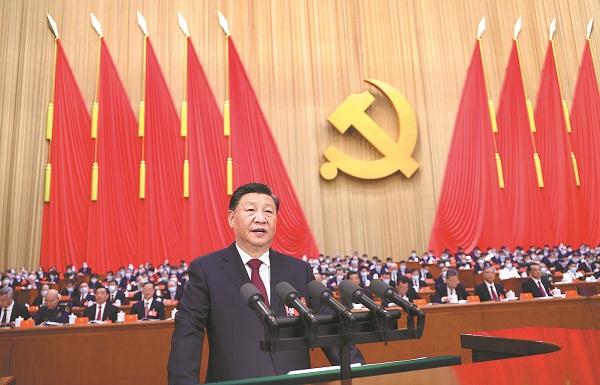CPC vows to boost modernization

Xi Jinping delivers a report to the 20th National Congress of the Communist Party of China on behalf of the 19th CPC Central Committee at the Great Hall of the People in Beijing on Sunday. JU PENG/XINHUA
Party's 'central task' is to build great modern socialist country, advance national rejuvenation, Xi says
The Communist Party of China has vowed to comprehensively advance national rejuvenation through a Chinese path to modernization, a central task the Party laid out for the next five years and beyond at the 20th CPC National Congress, which opened in Beijing on Sunday.
While delivering a report at the opening session of the congress on behalf of the 19th CPC Central Committee, Xi Jinping stressed the need to coordinate development and security, and he highlighted safeguarding national security and social stability in the course of promoting sustained growth.
"From this day forward, the central task of the CPC will be to lead the Chinese people of all ethnic groups in a concerted effort to realize the Second Centenary Goal of building China into a great modern socialist country in all respects and to advance the rejuvenation of the Chinese nation on all fronts through a Chinese path to modernization," Xi said.
He said that the next five years will be crucial for getting the efforts to build a modern socialist country in all respects off to a good start.
In a two-step development strategy, the CPC aims to basically realize socialist modernization by 2035, and then build China into a great modern socialist country that is prosperous, strong, democratic, culturally advanced, harmonious and beautiful by the middle of this century.
Xi said that China aims to lead the world in composite national strength and international influence by the middle of this century. He set out the major principles in the nation's endeavor to build a modern socialist China in all respects.
"On the journey ahead, we must firmly adhere to the major principles of upholding and strengthening the Party's overall leadership, following the path of socialism with Chinese characteristics, applying a people-centered development philosophy, remaining committed to deepening reform and opening-up, as well as carrying forward our fighting spirit," he said.
Xi mentioned in the report a wide range of areas in which China will strive for further progress, including high-quality economic growth, balanced development, ecological conservation, people's well-being, strengthening the Party, law-based governance, high-level opening-up, independent technological innovation and diplomatic efforts to promote world peace and development.
On the Taiwan question, which is considered as China's core interest, Xi reiterated striving for China's complete reunification in a peaceful way, but said "we will never promise to renounce the use of force". Resolving the Taiwan question and realizing China's complete reunification is, for the Party, a historic mission and an unshakable commitment, he said.
In analyzing the environment for the country's development, Xi said that China has entered a period of development in which strategic opportunities, risks and challenges are concurrent and uncertainties and unforeseen factors are rising.
Warning of various unpredictable dangerous events ("black swans") and foreseeable but unaddressed dangers ("gray rhinos") that may occur at any time, he urged Party members to be more mindful of potential dangers, be prepared to deal with worst-case scenarios, and be ready to "withstand high winds, choppy waters, and even dangerous storms".
He urged the whole Party to meet obstacles and difficulties head on, ensure both development and security, and prepare well to surmount difficulties and challenges on the road ahead.
The Party will take coordinated steps to ensure external and internal security, homeland and public security, traditional and nontraditional security, as well as its own security and common security with others, he said.
